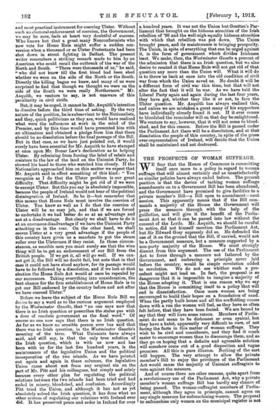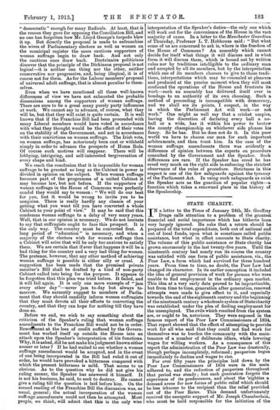THE PROSPECTS OF WOMAN SUFFRAGE.
WE fear that the House of Commons is committing itself once more to a policy in regard to woman suffrage that will almost certainly end as unsatisfactorily as similar policies have always ended before. The present position is that the device of tacking woman suffrage amendments on to a Government Bill has been abandoned, and the Government have promised to give facilities to private member's Billâa Bill open to amendmentânext session. This apparently means that if the Bill com- mands a majority of the House the Government will press the measure through with the help of the guillotine, and will give it the benefit of the Parlia- ment Act so that it can be passed into law without the consent of the Lords. Mr. Asquith, we should be careful to notice, did not himself mention the Parliament Act, but Sir Edward Grey expressly did so. He defended the use of it on the ground that the Bill, if carried, would not be a Government measure, but a measure supported by a. non-party majority of the House. We must strongly dissent from this argument. The use of the Parliament Act to force through a measure not fathered by the Government, and embracing a principle never laid before the country, would be simply revolution added to revolution. We do not see whither such a pre- cedent might not lead us. In fact, the proposal is so dangerous that it is impossible to imagine a majority of the House adopting it. That is one reason why we say that the House is committing itself to a policy that will end in dissatisfaction. Once more women are being encouraged to build their hopes on a foundation of sand. When the partly built house and all the scaffolding comes down with a run the women will feel, as they have so often felt before, that they have been fooled. We are bound to say that they will have some reason. Members of Parlia- ment do not mean to be dishonest or even cynical, but they have a habit, apparently very difficult to cure, of not facing the facts in this matter of woman suffrage. They wish to be civil and considerate, and they find it much easier to encourage women than to discourage them, and so they go on hoping that a definite and agreeable solution will somehow come out of a good disposition and vague promises. All this is pure illusion. Nothing of the sort will happen. The very attempt to allow the private member's Bill to enjoy the privileges of the Parliament Act would cause the majority of Unionist suffragists to vote against the measure. And of course there are other reasons, quite apart from a revolutionary use of the Parliament Act, why a private member's woman suffrage Bill has hardly any chance of being passed. The woman-suffragist members of Parlia- ment, although they agree in principle, cannot agree on any single measure for enfranchising women. The proposal to enfranchise only women on the municipal register is not " democratic " enough for many Radicals. At least, that is the reason they gave for opposing the Conciliation Bill, and no one has forgotten how Mr. Lloyd George's torpedo blew it up. But directly the proposal is made to enfranchise the wives of Parliamentary electors as well as women on the municipal register the more cautious supporters of woman suffrage begin to draw back. And notonly the cautious ones draw back. Doctrinaire politicians discover that the principle of the Dickinson proposal is not logicalâit is neither one thing nor the other, neither conservative nor progressive, and, being illogical, it is of course not for them. As for the Labour members' proposal of universal adult suffrage, that is almost peculiar to them- selves.
Even when we have mentioned all these well-lmown differences of view we have not exhausted the probable dissensions among the supporters of woman suffrage. i There are sure to be a great many purely partyinfluences at work. We cannot say in advance, of course, what they will be, but that they will exist is quite certain. It is well known that if the Franchise Bill had been proceeded with many Liberal members would have voted in accordance with what they thought would be the effect of their votes on the stability of the Government, and not in accordance with their convictions on woman suffrage. The Irish vote, on woman suffrage, has notoriously been cast or withheld simply in order to advance the prospects of Home Rule. Of course such motives will reappear. There will be lobbying, intriguing, and self-interested tergiversation of every shape and kind.
We reach the conclusion that it is impossible for woman suffrage to be granted so long as the Cabinet in power is divided in opinion on the subject. When woman suffrage becomes part of the programme of a united Cabinet it may become law, but not before. If the supporters of woman suffrage in the House of Commons were perfectly candid they would say to women : " We will do our best for you, but it would be wrong to invite you to be sanguine. There is really hardly any chance of your getting what you want till you have converted a whole Cabinet to your point of view." It may be said that this condemns woman suffrage to a delay of very many years. Well, that in our opinion is necessary. We do not hesitate to say that suffragists ought to face this prospect. It is the only way. The country must be converted first. A long period of "education" is necessary, and when a majority of the electors wish for woman suffrage then a Cabinet will arise that will be only too anxious to satisfy them. We are certain that if ever that happens it will be a bad thing for the country and a very bad thing for women. The pretence, however, that any other method of achieving woman suffrage is possible is either silly or cruel. A suggestion has been made that the promised private member's Bill shall be drafted by a kind of non-party Cabinet called into being for the purpose. It appears to be forgotten that this plan was tried before. It failed, and it will fail again. It is only one more example of " jam every other day "ânever jam to-day but always to- morrow. We earnestly suggest to members of Parlia- ment that they should candidly inform women suffragists that they must devote all their efforts to converting the country, and that they can hope for nothing till they have done so.
Before we end, we wish to say something about the criticism of the Speaker's ruling that woman suffrage amendments to the Franchise Bill would not be in order. ReseilTment at the loss of credit suffered by the Govern- ment has worked itself up outside the House into an attack upon the Speaker's interpretation of his functions. i Why, it is asked, did he not make his judgment known either sooner or later ? If he had waited to see whether a woman suffrage amendment would be accepted, and in the event of one being incorporated in the Bill had ruled it out of order, he would have provoked a bitterness compared with which the present bitterness is mild. That seems to us obvious. As to the question why he did not give his ruling sooner, the Speaker has answered it himself. It is not his business, he said, to seek to destroy. He cannot give a ruling till the question is laid before him. On the second reading of the Franchise Bill the discussion was, as usual, general; the actual incorporation of the woman suffrage amendments could not then be attempted. Most people, we think, will admit that this is the only wise interpretation of the Speaker's dutiesâthe only one which will work out for the convenience of the House in the vast majority of cases. In a letter to the Manchester Guardian of Thursday, Professor L. T. Hobhouse said : " But what some of us are concerned to ask is, where is the freedom of the House of Commons ? An assembly which cannot decide for itself what things it will discuss and in what form it will discuss them, which is bound not by written rules nor by traditions intelligible to the ordinary man and accepted by all its members, but by the interpretation which one of its members chooses to give to those tradi- tions, interpretations which may be concealed at pleasure and produced at the precise moment when they will most confound the operations of the House and frustrate its workâsuch an assembly has delivered itself over in bondage to an authority of its own choosing. Such a method of proceeding is incompatible with democracy, and we shall see its points, I suspect, in the way in which the Parliament Act will workâor not work." One might as well say that a cricket umpire, having the discretion of declaring every ball a no- ball or a wide, has it within his power to bestow the county championship on whichever side pleases his fancy. So he has. But he does not do it. In this poor world we have to choose our man for such important arbitraments, and then trust him. In the case of the woman suffrage amendments there was evidently a difference of opinion between the experts on procedure consulted by the Government and the Speaker. Suck differences are rare. If the Speaker has erred he has erred very much on the right side in enforcing the strictest observance of the rules of procedure. Strictness in this respect is one of the few safeguards against the tyranny of the Parliament Act. In using such safeguards as exist the Speaker acts as the guardian of popular rightsâa function which takes a renowned place in the history of the Speakership.











































 Previous page
Previous page